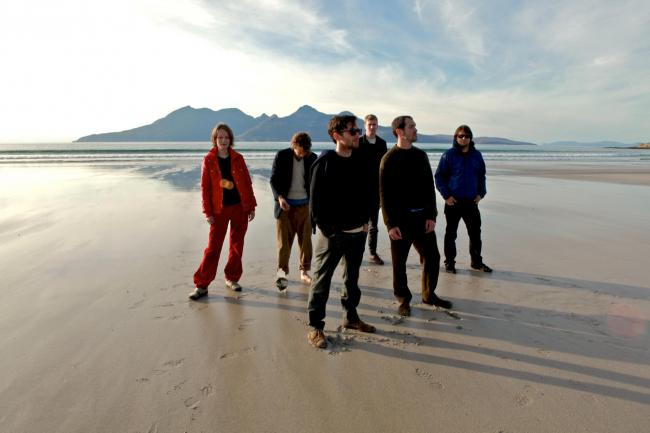MOST READ
- interview with xiexie オルタナティヴ・ロック・バンド、xiexie(シエシエ)が実現する夢物語
- Chip Wickham ──UKジャズ・シーンを支えるひとり、チップ・ウィッカムの日本独自企画盤が登場
- Natalie Beridze - Of Which One Knows | ナタリー・ベリツェ
- 『アンビエントへ、レアグルーヴからの回答』
- interview with Martin Terefe (London Brew) 『ビッチェズ・ブリュー』50周年を祝福するセッション | シャバカ・ハッチングス、ヌバイア・ガルシアら12名による白熱の再解釈
- VINYL GOES AROUND PRESSING ──国内4か所目となるアナログ・レコード・プレス工場が本格稼働、受注・生産を開始
- Loula Yorke - speak, thou vast and venerable head / Loula Yorke - Volta | ルーラ・ヨーク
- interview with Chip Wickham いかにも英国的なモダン・ジャズの労作 | サックス/フルート奏者チップ・ウィッカム、インタヴュー
- interview with salute ハウス・ミュージックはどんどん大きくなる | サルート、インタヴュー
- Kim Gordon and YoshimiO Duo ──キム・ゴードンとYoshimiOによるデュオ・ライヴが実現、山本精一も出演
- Actress - Statik | アクトレス
- Cornelius 30th Anniversary Set - @東京ガーデンシアター
- 小山田米呂
- R.I.P. Damo Suzuki 追悼:ダモ鈴木
- Black Decelerant - Reflections Vol 2: Black Decelerant | ブラック・ディセレラント
- Columns ♯7:雨降りだから(プリンスと)Pファンクでも勉強しよう
- Columns 6月のジャズ Jazz in June 2024
- Terry Riley ——テリー・ライリーの名作「In C」、誕生60年を迎え15年ぶりに演奏
- Mighty Ryeders ──レアグルーヴ史に名高いマイティ・ライダース、オリジナル7インチの発売を記念したTシャツが登場
- Adrian Sherwood presents Dub Sessions 2024 いつまでも見れると思うな、御大ホレス・アンディと偉大なるクリエイション・レベル、エイドリアン・シャーウッドが集結するダブの最強ナイト
Home > Columns > 「ブリティッシュ・シー・パワー」というバンド名の意味の変化
9月4日、イギリス海軍が建造した史上最大で最強の航空母艦、HMS(女王陛下の)クイーン・エリザベス号が横須賀港に寄港した。アルマダの海戦でスペインの無敵艦隊を沈めた16世紀の女王の名を冠したこの船は、旧大英帝国がかつて足を踏みならしたシンガポールにも停泊しており、象徴性と政治性を存分に誇示したアジア・ツアーを敢行したわけだ。イギリスは、この巨大な新しい船を使って軍事力を見せつけた。まるで年老いた男が、ブリティッシュ・シー・パワーのグレイテスト・ヒッツを演奏するかのように。
そのひと月前、バンド、British Sea Power(ブリティッシュ・シー・パワー)は、バンド名をより合理的なSea Power (シー・パワー)に縮めることを発表した。彼らは慎重に言葉を選びながら、“ブリティッシュ”を切ることは、イギリスそのものへの嫌悪を意味することではないと強調し、イギリスに限らず世界的な流れとしての、“ある種のナショナリズムの台頭による孤立主義や、敵対的なナショナリズムと混同されるリスクを回避したい”ということを理由にあげた。
実際、そのようなナショナリズムの傾向は、イギリスでも明らかに問題となっている。「21世紀のヨーロッパのフェスティヴァルに参加した若者がプログラムを見て、“パワー”という言葉の横に“ハンガリアン”とか“ロシアン”という言葉を含むバンド名を目にした時に、どのようなことを連想するのかを考えてみてほしい」という彼らの問いかけは、“ブリティッシュ”という言葉も同じように不愉快で、暴力的なイメージを呼び覚ましてしまうかもしれない可能性を示唆している。イギリスのストリートや報道機関の多くが、ヨーロッパや外国人全体に対して敵意をむき出しにする雰囲気を増長させ、ポスト・ブレグジットに拍車をかけてしまっているのだ。
20年前、バンドがブリティッシュ・シー・パワーという名前を選んだときには、それは道理に反してはいるが、コミカルなばかばかしさとして受け止められていたことは明らかだ。“ブリティッシュ・シー・パワー”は、侵略者に対する英雄的な戦いや、過ぎ去りし日の帝国の華やかな虚栄の古い物語だった。彼らのファースト・アルバム『ザ・ディクライン・オブ・ブリティッシュ・シー・パワー』(2003)は、取返しがつかぬほど変わってしまった場所から過去を振り返る、ノスタルジックで皮肉な声明だった。
そのアルバムには、ある意味、戦後の大英帝国の衰退と、その誕生の際の産声がロックンロールだった新しいイギリスとが交錯していた。ザ・ビートルズの1964年の映画、『A Hard Day's Night (ビートルズがやってくる ヤァ!ヤァ!ヤァ!)』では、彼らと同じ鉄道の車両に乗り合わせて閉じ込められた男が、「私はお前たちのような人種のために戦争で戦ったんだ」と叫び、敬意を要求したが、「でも勝利を後悔しているだろう?」とリンゴに反撃されている。その数年後には、ビートルズは『サージェント・ペパーズ・ロンリー・ハーツ・クラブ・バンド』で、イギリス軍の過去のイメージをとりあげ、ノスタルジーと時代錯誤的なばかばかしさを混ぜ合わせて、サイケデリックの領域に攻め込み、ザ・フーは、イギリス国旗とRAF(英国空軍)のラウンデル(円形の紋章)をポップ・アート・デザインのモチーフにしてしまった。
ザ・キンクスは、アルバム『アーサー、もしくは大英帝国の衰退ならびに滅亡』(1969)で、新世代ブリティッシュ・ロックの消えゆく過去への陶酔を、あからさまに、力強く表現した。一方、1990年代初頭には、ブラーなどのブリットポップ・バンドが過去のイギリスの皮肉でセンティメンタルなイメージ(シングル「フォー・トゥモロー」のジャケットに描かれたスピットファイア戦闘機や、アルバム『モダン・ライフ・イズ・ラビッシュ』(1993)の蒸気機関車など)を利用し、60年代のブリティッシュ・ロックの栄光の日々と同時に、大英帝国の過去に対するブリティッシュ・ミュージックの奇妙に相反する、ノスタルジックでシニカルな姿勢の両方を描いてみせた。ブリティッシュ・シー・パワーというバンド名は、まさにこの壮大さ、喪失感、プライドと自虐的でドライなユーモアを想起させるのだ。
しかし、このイメージが物語っているのは、内向きな、白人世界のイギリスの姿に過ぎない。1990年代はブリットポップの時代であったかもしれないが、同時にトリップホップ、コーナーショップのようなバンドやドラムンベースなど、イギリスの植民地時代の過去に連なる移民の2世や3世が、さまざまな経験や異なる文化的な視点から、イギリスらしさを再構築していたのだ。
ブリットポップが使用していたノスタルジックで愛国的なイメージは、もとは社会批判が発端となっていたかもしれないが、すぐに、人びとが過去の大英帝国の郷愁に浸り、その皮肉が暗示する意味合いを完全には受け入れずにすむ、保護膜のような働きをした。やがてそのイメージがナショナリズムの象徴として常態化し、列車のなかの尊大な男が、ビートルズの騒々しいロックンロールを忌み嫌ったように、多文化の共生する現代国家に憤る人びとの、称讃の的となった。その結果、ブリティッシュ・シー・パワーのような名前に込められていた皮肉は効力を失ったのだ。ナショナリストたちは皮肉には取り合わないし、若者は皮肉を偽善的な行為を覆い隠すものとして疑ってかかる傾向が強まっている。
そのような時代において、かつて帝国が支配した海を、国旗を振りかざしながら巡回し、何世紀にもわたる軍の戦いに敬意を表して付けられた名を持つ軍艦とは異なる種類のパワーを、バンドがEP「Waving Flags」(2008)のように定義しなおしたことは、正しかったのだろう。イギリスのように、どこにいても海岸から100キロ以内しか離れていないような場所では、海が強力な必然性を持ち、国民は天気や気候を左右する気まぐれな海に翻弄されて生活している。海は潮の入り江を行き来し、餌を与えたり、打ち付けたり、唸ったり宥めたりしながら、一定の島のシンフォニーを奏でているのだ。それは、国を世界から切り離すものであると同時に、どことでも繋がるものであり、その意味では、“Sea Power”は“Britain”(ブリテン=イギリス)という言葉で騒ぎ立てることを、ほんの小さな心配事にしてみせることに成功している。
'The changing meanings of "British Sea Power"'
Ian F.Martin
On September 4th, the aircraft carrier HMS Queen Elizabeth, the largest and most powerful warship ever constructed for Britain’s Royal Navy, docked at the port of Yokosuka. Named after the 16th Century queen whose navies sank the Spanish Armada, the ship had earlier stopped at the old British Empire stomping grounds of Singapore, so there was plenty of symbolism and politics on display in this Asian tour. Britain was using this huge new ship to flex its military muscles: an old man performing the greatest hits of British sea power.
A month earlier, the band British Sea Power had announced that their name would be shortened to the more streamlined Sea Power. They were very careful in their choice of words, stressing that cutting “British” didn’t signify any dislike of Britain itself, and placing their reasons in the global context of “a rise in a certain kind of nationalism in this world – an isolationist, antagonistic nationalism that we don’t want to run any risk of being confused with” rather than anything specific to the UK.
And yet those nationalist trends clearly are a problem in the UK. When the band ask us to imagine “a youngster at a European festival in the 21st century looking at the programme and seeing a band name including the word ‘Hungarian’ or ‘Russian’ alongside ‘Power’” and then think about what sort of images and associations might run through their head, they’re implying that the word “British” could raise similarly uncomfortable and possibly violent images — ones that the increasingly hostile atmosphere on some of Britain’s streets and in most of its press towards Europe and foreigners in general will have only encouraged post-Brexit.
When the band chose the name British Sea Power twenty years ago, it seemed obvious that the name was comically absurd: “British sea power” was an old story of heroic battles against invaders and the pomp of an imperial past long gone. Their first album title, “The Decline of British Sea Power” was a statement both nostalgic and ironic, looking back at the past from a place that had irrevocably changed.
In a way, the postwar decline of the British Empire is intertwined with a new Britain whose birth screams were the sound of rock’n’roll. “I fought the war for your sort,” was the pompous demand for respect of a man trapped in a railway carriage with The Beatles in their 1964 movie A Hard Day’s Night, only for Ringo to fire back, “I bet you’re sorry you won.” A couple of years later, they used Sgt. Pepper’s Lonely Hearts Club Band to take military-edged imagery from Britain’s past and push its mix of nostalgia and anachronistic absurdity into the realm of the psychedelic, while The Who turned the national flag and Royal Air Force military roundels into pop-art design motifs.
The Kinks expressed the rising generation of British rock’s fascination with the fading past most explicitly and powerfully in their album Arthur (Or the Decline and Fall of the British Empire). Meanwhile, in the early 1990s, Britpop bands like Blur seized on ironically sentimental images of Britain’s past (the Spitfire fighter planes on the cover of their For Tomorrow single, the steam train painting on the cover of the album Modern Life is Rubbish) in a way that both both referenced the glory days of 60s British rock and the peculiarly ambivalent attitude of British music to the nation’s imperial past, both nostalgic and cynical. The band name British Sea Power evokes just this mix of grandeur, loss, pride and self-effacing dry humour.
But it’s still an inward-looking and distinctly white version of Britain that this imagery speaks to. The 1990s may have been the generation of Britpop, but it was also the era of trip-hop, bands like Cornershop, drum’n’bass — music born from second- and third-generation immigrants with connections to Britain’s colonial past, that was reshaping Britishness once more out of a very different set of experiences and cultural reference points.
The nostalgic and patriotic images that Britpop had used may have begun with an edge of social criticism, but that irony soon became a protective coating that allowed people to bask in the nostalgia of an imperial past without accepting its full implications, and eventually the imagery became normalised as nationalistic symbols, celebrated in a way every bit as resentful of the multicultural modern nation as the pompous man in the train carriage was to the noisy rock’n’roll of The Beatles. As a result, the irony embedded in a name like British Sea Power loses its bite: Nationalists don’t deal in irony or nuance, and young people seem increasingly suspicious of irony as a cloak for insincerity.
In such times, perhaps the band are right in framing a different sort of sea power — one removed from warships named in honour of centuries-old military battles “Waving Flags” on a tour through seas the Empire once ruled. In a place like Britain, where you are never more than a hundred kilometres from the coast, the sea is a powerful inevitability and the nation lives subject to its whims, defining the weather and climate, as it rushes back and forth up tidal inlets, feeding and battering, roaring and soothing in a constant island symphony. It’s both what cuts the country off from the rest of the world but also what connects it to everywhere, and in that sense, “Sea Power” makes any fuss over a word like “Britain” rather a small concern.
Profile
 Ian F. Martin
Ian F. MartinAuthor of Quit Your Band! Musical Notes from the Japanese Underground(邦題:バンドやめようぜ!). Born in the UK and now lives in Tokyo where he works as a writer and runs Call And Response Records (callandresponse.tictail.com).
COLUMNS
- Columns
スティーヴ・アルビニが密かに私の世界を変えた理由 - Columns
6月のジャズ- Jazz in June 2024 - Columns
♯7:雨降りだから(プリンスと)Pファンクでも勉強しよう - Columns
5月のジャズ- Jazz in May 2024 - Columns
E-JIMAと訪れたブリストル記 2024 - Columns
Kamasi Washington- 愛から広がる壮大なるジャズ絵巻 - Columns
♯6:ファッション・リーダーとしてのパティ・スミスとマイルス・デイヴィス - Columns
4月のジャズ- Jazz in April 2024 - Columns
♯5:いまブルース・スプリングスティーンを聴く - Columns
3月のジャズ- Jazz in March 2024 - Columns
ジョンへの追悼から自らの出発へと連なる、1971年アリス・コルトレーンの奇跡のライヴ- Alice Coltrane - Columns
♯4:いまになって『情報の歴史21』を読みながら - Columns
攻めの姿勢を見せるスクエアプッシャー- ──4年ぶりの新作『Dostrotime』を聴いて - Columns
2月のジャズ- Jazz in February 2024 - Columns
♯3:ピッチフォーク買収騒ぎについて - Columns
早世のピアニスト、オースティン・ペラルタ生前最後のアルバムが蘇る- ──ここから〈ブレインフィーダー〉のジャズ路線ははじまった - Columns
♯2:誰がために音楽は鳴る - Columns
『男が男を解放するために』刊行記念対談 - Columns
1月のジャズ- Jazz in January 2024 - 音楽学のホットな異論
第2回目:テイラー・スウィフト考 - ――自分の頭で考えることをうながす優しいリマインダー


 DOMMUNE
DOMMUNE